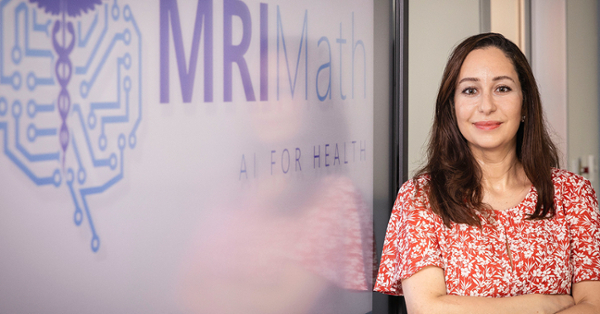Rowan Innovations: Moving great ideas from the lab to the marketplace
Rowan Innovations: Moving great ideas from the lab to the marketplace

Rowan University researchers are developing promising ideas and new technology in their labs—the trick is getting their new inventions out into the marketplace. The National Science Foundation’s Innovation Corps (I-Corps) program accelerates the commercialization process.
Since 2018, Rowan researchers have earned 10 national I-Corps awards, plus another through the National Institutes of Health—more than any other R2 institution without a formal designation as an I-Corps site or node, noted Dr. Yatin Karpe, director of the University’s Office of Technology Commercialization and Rowan Innovations.
It’s an indicator of Rowan’s emerging reputation for innovation and self-driven entrepreneurial focus, said Dr. Tabbetha Dobbins, interim vice president for research.
“The I-Corps program is the National Science Foundation’s chief mechanism for developing innovators among university faculty,” Dobbins said. “Rowan University’s track record demonstrates we’re a fast-growing incubator for big ideas.”
The I-Corps program teaches researchers how to tailor their ideas to meet the needs of potential customers and industry, and gain a clearer understanding of the value of their inventions in the marketplace. Designed to support “deep technologies” stemming from fundamental discoveries in science and engineering, the I-Corps program includes regional training workshops and networking opportunities for researchers.
Fifteen Rowan teams have attended regional I-Corps training, qualifying them for potential national funding, Karpe said. That’s a significant achievement for an institution that doesn’t serve as an I-Corps training site, since busy faculty researchers aren’t required to invest the time and energy into building a new venture.
“We get them excited and get them to understand the entrepreneurial process,” said Karpe, who used his own connections to tap Rowan into the I-Corps network.
A growing national initiative involving eight federal agencies, the I-Corps program has been pivotal in helping translate scientific discoveries into products and processes that benefit society, said Christina Pellicane, a nationally certified NSF I-Corps instructor and independent consultant specializing in entrepreneurship education.
“Rowan University has a strong foundation of basic research and, nowadays, also has a culture of entrepreneurship and innovation—not only at the faculty level, but also within upper administration,” said Pellicane, who is also COO and co-founder at Lignolix, a chemical tech startup. “That combination of strong scientific research and an entrepreneurial-minded culture will continue to reap strong technology-enabled startups.”
Dr. Nidhal Bouaynaya earned Rowan’s first $50,000 national I-Corps award to support her innovation: artificial intelligence to dramatically improve the detection of brain tumors—about three years earlier than the standard of care. She’s also the first researcher from Rowan to secure additional I-Corps training through the National Institutes of Health Small Business Innovation Research funding program.
“Everything is done by eye-balling nowadays with doctors, or by hand,” said Bouaynaya, who co-founded MRIMath, LLC, in 2017 with Dr. Hassan Fathallah-Shaykh, a neuro-oncologist and mathematician at the University of Alabama School of Medicine. “We built an AI agent that achieves pixel-level accuracy and delineates the tumor, computing exact volumetrics and 3D coordinates for tumor surveillance in neuro-radiology and radiotherapy in oncology.”
The I-Corps program gave their Rowan-affiliated startup a jump on product development.
“The NSF I-Corps training helped my team take our research outside of the lab and define a data-driven commercialization plan,” said Bouaynaya, professor in the Department of Electrical & Computer Engineering and associate dean for Research and Graduate Studies at the Henry M. Rowan College of Engineering.
With his I-Corps support, Dr. Mohammad Abedin-Nasab and his team interviewed 143 trauma surgeons, hospital executives and patients with broken femurs, “finding a huge unmet need for improving the alignment outcomes of femur fracture surgery.”
Since then, he has successfully taken his orthopedic surgical robotic system, Robossis, through cadaver testing.
“It was a major milestone for commercialization of the first surgical robot for long-bone fracture alignment in the market,” said Abedin-Nasab, a biomedical engineering professor.
Dr. Cheng Zhu and his research partner from the School of Earth & Environment, Dr. Charles McGlynn, are working together to build a strong, inflatable “shaker shield” intended to protect people from earthquakes and flash floods. Using their I-Corps award, they interviewed more than 200 potential customers and have a patent pending for their innovation, developed from aircraft evacuation slide technology.
Through I-Corps, they attended the Earthquake Countermeasures Technology Exhibition in Yokohama, Japan; conducted site visits at emergency response centers in St. Louis and on the West Coast; and visited with private sector professionals responsible for skyscrapers with seismic protection systems.
“The program provided us with a great opportunity to interview a large variety of potential customers and develop our business model,” said Zhu, a civil and environmental engineering professor.